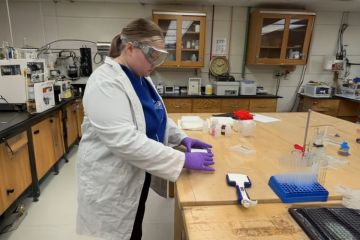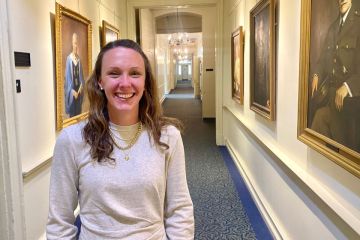New Nursing Dean Brings Big Ideas and Bold Vision to Widener

Widener welcomed Audrey Snyder as dean of the Jack & Nancy Dwyer School of Nursing this summer to lead the nationally recognized school. A celebrated educator, passionate healthcare advocate, and accomplished scholar, Snyder brings more than 40 years of experience to Widener. She comes to the Pride from the University of North Carolina Greensboro where she served as professor and associate dean for Community Engagement and Academic Partnerships.
We took some time to chat with her to learn more about her background, expertise and vision for Widener nursing.
Welcome to Widener! As a new leader on campus, tell us a little about yourself.
As a proud first-generation college graduate with Native American ancestry, I carry a deep appreciation for the transformative power of education and community. My path in nursing—from a diploma prepared nurse at the bedside to nurse practitioner role to PhD in nursing research, has been grounded in advocacy, compassion, and a commitment to inclusive care. Joining this campus as a new leader, I bring both professional experience and a personal passion for nurturing the next generation of healthcare professionals. I’m also a devoted family member—a mother and grandmother, and wife to a wonderful husband, Thomas Nayduch, who along with our beloved dog, Sasha, keeps life joyful and grounded. I look forward to building meaningful connections across campus and helping our students thrive in every dimension of their lives.
What attracted you to join the Pride?
I was drawn to the Widener Pride for several compelling reasons. Its strong reputation for academic excellence and innovation in nursing education stood out immediately. Beyond that, its location allows me to remain closely connected to my daughter, son-in-law and grandchildren—a support system that enriches both my personal and professional life. I was also impressed by the school’s commitment to fostering leadership, and interprofessional collaboration, which aligns with my desire to contribute meaningfully to the future of nursing. Being part of a community that values both clinical excellence and the broader mission of healthcare equity resonates deeply with me.
Nurses are critical to a healthy society. Across the workforce we see nurses provide care at the bedside, lead complex healthcare systems, teach in the classroom, and drive research and innovation. How will the next generation of Widener nurses impact the world?
The next generation of Widener nurses—registered nurses, advanced practice nurses, nurse educators, and nurse researchers—will be catalysts for lasting change in health and society. Widener’s nursing graduates will continue to deliver compassionate, expert care on the frontlines of healthcare, while advanced practice nurses expand access and lead interdisciplinary teams through complex healthcare challenges. Nurse educators will shape the minds of future caregivers, instilling the values, knowledge, and critical thinking needed to thrive in an ever-evolving health landscape. Meanwhile, nurse researchers will convert everyday insights into powerful evidence, driving innovations that reshape education and care models, policies, and outcomes.
As part of this vision, I hope to increase international opportunities for our nursing students—broadening their perspectives, fostering cultural humility, and preparing them to lead in diverse healthcare environments around the world. Through global exchange, collaborative research, and cross-cultural learning, our students will not only deepen their clinical expertise but also develop the global awareness and adaptability essential for 21st-century nursing leadership.
Together, these professionals will lead with integrity, advocate for equity, and elevate the human experience in every setting they touch. The ripple effects of their work will be felt in communities, classrooms, clinical spaces, and global health systems for years to come.
What is your vision for Widener’s Dwyer School of Nursing?
My vision for Widener’s Dwyer School of Nursing is rooted in an unwavering commitment to advancing nursing education while boldly addressing the evolving challenges within healthcare and higher education. I believe this moment calls for strategic transformation, innovation, and an enduring dedication to excellence, inclusion, and collaboration.
Our Dwyer School of Nursing is built on a strong foundation of academic integrity, passionate faculty, and resilient students. We are uniquely positioned to seize new opportunities by expanding our reach, enriching our curriculum, and fostering a learning environment that empowers future nursing leaders.
The landscape of healthcare education is shifting rapidly—with technological advancements, demographic changes, and economic pressures. Specific to nursing, we face faculty shortages, limited access and affordability, and the urgent need to improve diversity, digital adaptability, and inclusion. Healthcare itself presents challenges such as geographic barriers, workforce shortages, infrastructure limitations, and health disparities.
There are many strategic actions that we can take for progress. In a time marked by uncertainty, we will embrace change and commit to leading boldly. We invite every stakeholder—faculty, staff, students, partners, and the broader community—to join in shaping a brighter future for nursing education. Together, we will build trust, foster innovation, and earn recognition on local, regional, national, and international stages. Rising to the occasion, Widener nursing will empower the next generation of nurses and improve healthcare in our region and beyond.
You have an extensive background in promoting access to care for rural and under-resourced populations. Why is it important to create pathways to patient care?
Community engagement isn’t just a cornerstone of the Widener student experience—it’s also deeply embedded in my professional philosophy. My recent tour of Chester introduced me to the extraordinary resilience and dedication of its community members and organizations. With each connection, I’ve begun exploring ways the Dwyer School of Nursing and the university can collaborate meaningfully to support and elevate these efforts.
The closure of Crozer Health facilities has created a critical void in local healthcare access. I’m especially grateful for the work being done by our Chester Community Clinic to help bridge that gap. But we must go further—bringing care directly to where people are, and building sustainable, community-rooted partnerships that promote wellness, health equity, and trust.
As a leader in public health and community engagement, I see tremendous opportunities to expand mobile health outreach, deepen interprofessional collaborations, and elevate student learning through immersive community-based experiences. Our goal is to nurture a generation of nurses who understand that care doesn't begin and end within hospital walls—it begins with listening, showing up, and being accountable to the people we serve.
As an expert in disaster response and research, can you tell us about the role nurses play in disaster relief?
Nurses are indispensable leaders in disaster response, bringing clinical expertise, strategic planning, and compassionate care to the front lines. As highly trained professionals, they model preparedness by establishing personal and professional disaster plans, and by educating patients and communities to anticipate the “What ifs.” This includes guiding the development of emergency plans tailored to individual and population needs.
During disasters, nurses are among the first responders, conducting initial assessments, triaging victims, and delivering direct patient care—including decontamination when necessary. They make rapid decisions about allocating limited resources and provide essential psychological support to survivors and responders alike. Their ability to remain composed under pressure ensures continuity of care and stabilizes chaotic environments.
Beyond the acute response, nurses contribute to research that strengthens disaster preparedness and response strategies. Many serve on Disaster Medical Assistance Teams, collaborating with interdisciplinary partners to deploy efficient, lifesaving interventions during national emergencies.
Nurses also play a vital role in public health initiatives. They educate the public, organize community response efforts, and lead vaccination campaigns that prevent disease outbreaks during and after disasters. Their unique blend of clinical, organizational, and educational skills makes them critical assets in both immediate crisis management and long-term recovery planning.
You’re coming to Widener from North Carolina. Is there anything on your Philadelphia bucket list that you’re looking forward to experiencing?
It’s been a while since we’ve spent meaningful time in Philadelphia, so I’m genuinely looking forward to revisiting some iconic sites. Independence National Historic Park and the National Constitution Center are at the top of our list—they’re rich in history and always inspiring. We’re also planning a trip to the Philadelphia Zoo, which never disappoints.
Beyond the city, we’re beach lovers and avid whale watchers, so being closer to northeast ports opens up exciting possibilities. The chance to take more frequent whale watching trips is something we’re truly excited about. It’s a wonderful way to reconnect with nature and appreciate the beauty of this region.



